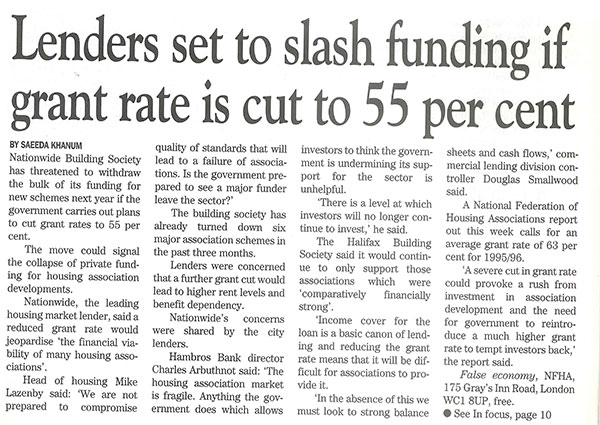You are viewing 1 of your 1 free articles
From the archive – housing associations hatch a plan to team up to access funding
Inside Housing looks back at what was happening in the sector this week five, 15 and 25 years ago
25 years ago
One of the biggest lenders to social landlords threatened to withdraw the bulk of its support for new schemes if the government followed through on proposals to cut grant rates to 55%.
Nationwide, which was the largest bank funder to the sector at the time, said a reduced grant rate would jeopardise “the financial viability of many housing associations”.
The move sparked fears that private funding for housing association development could collapse entirely.
Mike Lazenby, head of housing at Nationwide, said: “We are not prepared to compromise quality of standards that will lead to a failure of associations.”
Another major lender – Hambros Bank – echoed the warning, saying: “There is a level [of funding] at which investors will no longer continue to invest.”
15 years ago
Small housing associations were planning to pool staff with their larger peers in so-called “super development teams” in order to gain greater access to funding.
Inside Housing learned that at least two associations were planning to allow smaller rivals to piggyback onto their development departments so they could obtain social housing grant through the Housing Corporation’s partnering route.
Circle 33 confirmed that it was working on a scheme whereby associations without pilot partnering status would pool together to form project management teams operating out of a central base.
Howard Hughes, the association’s development director, explained how the approach would become increasingly important as traditional funding streams dried up.
He told Inside Housing: “For non-partnering associations, the alliance will be a vehicle for obtaining grant.”
Neil Hadden, deputy chief executive at the Housing Corporation, said he hoped the idea would be used as an example of good practice.
Picture: Getty
Five years ago
Ministers faced a court battle over proposed rent reforms unless the government allowed exemptions to the new rules for landlords set to be the worst affected.
It emerged that a number of stock transfer associations had consulted lawyers after the government unveiled changes to the rent regime from 2015, as it was feared it would result in millions of pounds in lost revenue.
The proposals would see the scrapping of rent convergence – the process of gradually increasing social rents until they align with ‘target’ rents – earlier than had been expected.
But associations argued that this would break an agreement they had struck with the government when target rents were introduced.









